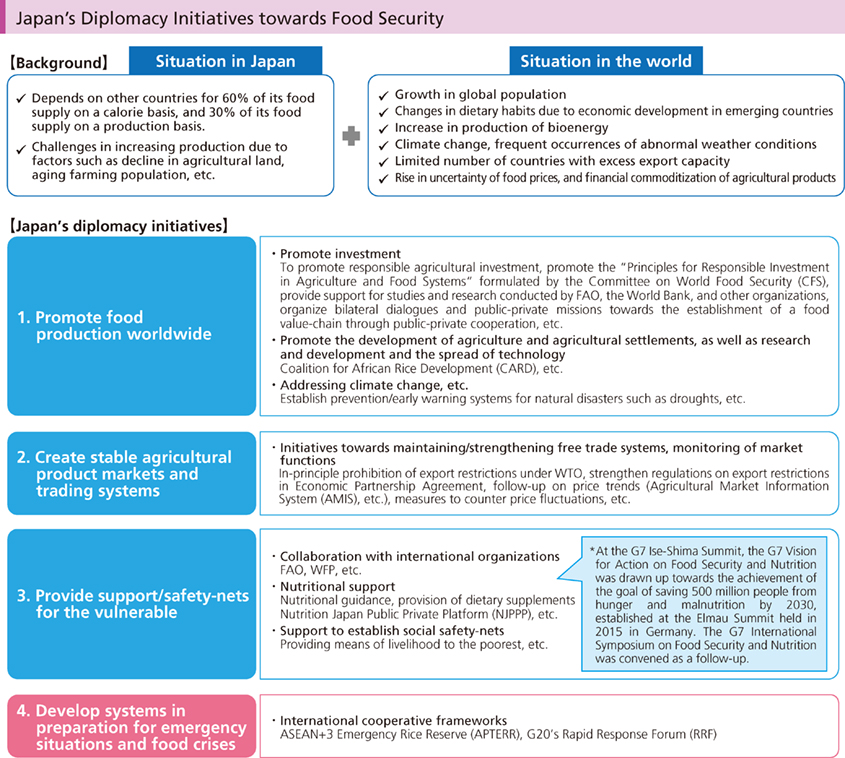(3) Food Security and Nutrition
The number of chronically undernourished people in the world is estimated at 815 million in 2016, rising from 777 million in the previous year, according to the “2017 State of Food Security and Nutrition in the World” jointly published by the Food and Agriculture Organization of the United Nations (FAO), the International Fund for Agricultural Development (IFAD), the World Food Programme (WFP), the United Nations Children's Fund (UNICEF), and the World Health Organization (WHO). After a prolonged decline of global hunger for over the last decade, this recent increase could signal a reversal of trends. This sends a clear warning signal that achieving the Goal 2 of the Sustainable Development Goals (SDGs), “End hunger, achieve food security and improved nutrition, and promote sustainable agriculture,” will require renewed efforts through new ways of working.
In order to achieve food security (a state where all people, at all times, can access sufficient, safe and nutritious food), there is a need for multifaceted measures based on international coordination. The measures include not only a sustainable increase in the production of food, but also improvement of nutrition (nutrition improvement during the first 1,000 days from a mother's pregnancy to her child's second birthday in particular has a significant impact on the child's growth thereafter), establishment of a social safety net (a mechanism in which people can live safely with peace of mind), provision of necessary food assistance, and implementation of countermeasures against infectious diseases among livestock.
<Japan's Efforts>
In light of these circumstances, Japan has provided food assistance based on requests from developing countries confronting food shortages. In FY2016, Japan contributed a total of ¥4.34 billion through bilateral food assistance in 15 countries, and provided approximately 70,000 tons of grains (rice, wheat, etc.) which mainly include Japanese government rice. In 2018, Japan serves as the chair of the Food Aid Committee, which comprises all the Parties of the “Food Assistance Convention.”

(Note) FAO: Food and Agriculture Organization of the United Nations
While conflicts are said to be a major factor behind starvation, the international community has been discussing the importance of addressing the starvation issue. To prevent the recurrence of starvation, Japan considers it is necessary to radically strengthen measures to tackle the fundamental causes of conflicts not only by taking post-conflict measures, but also by focusing on preventing the occurrence and recurrence of conflicts. Based on this view, Japan provided humanitarian assistance, including food distribution, and emergency assistance for the development of local human resources engaging in monitoring nutrition conditions as well as controlling and preventing pests in the Middle East and Africa regions, through international organizations such as FAO, in March and September 2017. Additionally, Japan has implemented further assistance through WFP, such as emergency food assistance, school feeding programs to improve access to education, and food assistance encouraging people to participate in development of agricultural land and social infrastructure in order to support the self-reliance of local communities. In 2016, WFP conducted activities including the distribution of approximately 3.5 million tons of food to 82 million people in 82 countries around the world. In 2017, Japan contributed a total of $175.46 million to WFP projects. Furthermore, Japan has assisted technical cooperation for the agricultural and rural development of developing countries, establishment of international standards and norms in the food and agriculture fields, and the development of statistics, etc. through FAO.
Meanwhile, Japan has provided support for research on the variety development conducted by Consultative Group on International Agricultural Research (CGIAR), which is comprised of 15 agricultural research centers. Japan also promotes cooperation through exchanges among researchers.
In addition, Japan has also supported the efforts of developing countries to enhance their own food safety. Concerning transboundary zoonotic diseases such as foot-and-mouth disease, Japan is reinforcing countermeasures in the Asia-Pacific region, in cooperation with the World Organisation for Animal Health (OIE) and FAO, under the Global Framework for Progressive Control of Transboundary Animal Diseases (GF-TADs), etc.
As for its initiatives of nutritional improvement, Japan has provided bilateral assistance for the promotion of breastfeeding and the training of healthcare professionals, and cooperates with multilateral assistance by contributing to organizations such as UNICEF and WFP. Japan has also participated in the international nutritional improvement initiative, Scaling Up Nutrition (SUN) as a donor country. In recent years, Japan has put effort into promoting nutritional improvement programs in collaboration with private companies, and launched the Nutrition Japan Public Private Platform (NJPPP) in 2016. Through this platform, in cooperation with partners from private companies, civil society, and academia (academic research institutions), Japan contributes to nutrition improvement specifically by arranging an environment that can boost initiatives of Japanese food-related enterprises, etc. for nutritional improvement in developing countries. Additionally, Japan-led efforts for nutrition improvement have been fully set out, including the launch of the “Initiative for Food and Nutrition Security in Africa (IFNA)” initiated by JICA with the aim of accelerating nutritional improvement in Africa.
